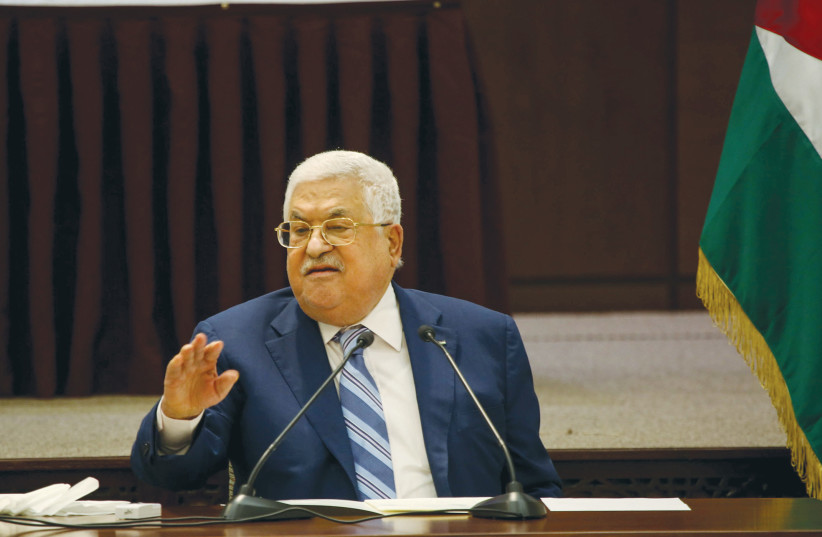Ahead of the visit this week to the region by US President Joe Biden, the Palestinian Authority has raised several issues it would like to see on the agenda. Biden is scheduled to visit Israel and the PA on Wednesday, Thursday and Friday before heading to Saudi Arabia, which is the main focus of his itinerary.
According to The Jerusalem Post’s Khaled Abu Toameh, Palestinian Authority head Mahmoud Abbas is concerned that the Palestinian issue could be sidelined while attention is trained on talk of a new Middle East security alliance that would see Israel and some Arab countries, including Saudi Arabia, come together to confront Iran and its terrorist proxies.
The Abraham Accords, created in 2020, bypassed the matter of a Palestinian peace process and the so-called Saudi Arab Peace Initiative of 2002 in order to normalize relations between the Jewish state and the United Arab Emirates, Bahrain, Morocco and Sudan. Although there is no sign that a similar peace treaty with Saudi Arabia is ready to be announced, it is clear that relations are warming there, too.
Over the weekend, Prime Minister Yair Lapid spoke with Jordan’s King Abdullah II and PA President Abbas, President Isaac Herzog also spoke with Abbas, and Defense Minister Benny Gantz met with the PA president in Ramallah, in the third such meeting between the two in less than a year. Ostensibly, the calls were greetings for the Eid al-Adha holiday but Biden’s trip was obviously on everyone’s mind.
Lapid’s conversation with Abbas was the first between an Israeli prime minister and the PA president in over five years. It was predictably condemned by the Likud but was a positive step since dialogue should always be ongoing.

As the Post’s Tovah Lazaroff noted, it is expected that Israel could announce concessions to the Palestinians during the visit. According to KAN News, Israel is weighing approval for Palestinian construction in Area C of the West Bank and the provision of 4G Internet. The Joint Economic Committee could also be revived.
Biden’s itinerary includes the first-ever visit by a US president to an east Jerusalem neighborhood, when he visits Makassed Hospital, the largest Palestinian medical center in the city.
During his stay, Biden will no doubt repeat his message about the unbreakable bond between the US and Israel and give his assurance that America supports Israel’s defense. Lapid will reiterate similar themes of the strong and lasting ties and of the US and Israel being firm allies.
At Sunday’s cabinet meeting, Lapid called Biden “one of the closest friends that Israel has ever had in American politics” and said the visit will deal “with both challenges and opportunities. The discussion of the challenges will focus first and foremost on the issue of Iran. Yesterday, it was revealed that Iran is enriching uranium in advanced centrifuges in complete contravention of the agreements it has signed.”
The international response should be to return to the UN Security Council and activate the sanctions mechanism at full force, Lapid said, adding that “We will discuss with the president and his team expanding security cooperation against all threats.”
The prime minister noted that Biden will be flying from Israel to Saudi Arabia and said: “He will carry with him a message of peace and hope from us. Israel extends its hand to all the countries of the region and calls on them to build ties with us, establish relations with us, and change history for our children.”
Israel would welcome a true peace with its Palestinian neighbors but this does not seem to be on the horizon. Meanwhile, there is no reason to refrain from creating peaceful relations with other Arab and Muslim states, especially in the face of the Iranian threat.
Israel needs to make it clear to the US that a nuclear Iran, unlike the Palestinian issue, is an existential threat for the Jewish state – and a global one. This is something that the Sunni Muslim countries recognize.
Promoting a diplomatic process with the Palestinians should not be linked to the Iranian issue. Furthering relations between Saudi Arabia and Israel is a positive move that would help hinder Iran’s race for nuclear weapons and capability, and create a more peaceful, prosperous and stable region. This should not be held up by Palestinian demands.
